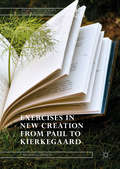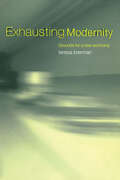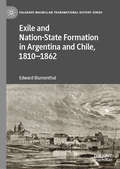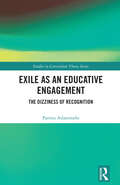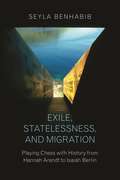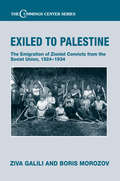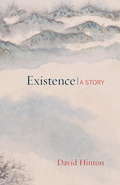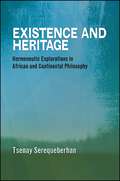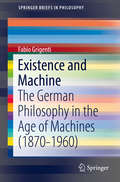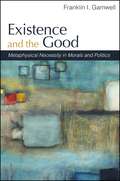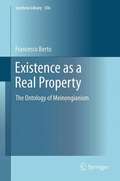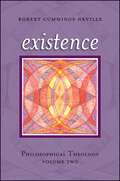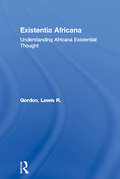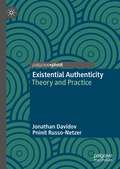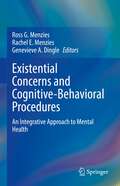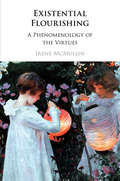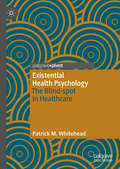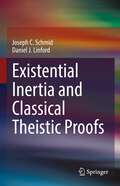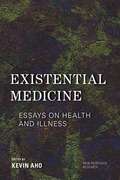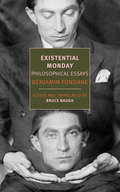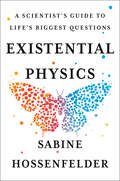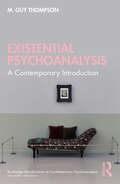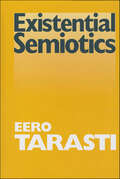- Table View
- List View
Exercises in New Creation from Paul to Kierkegaard (Radical Theologies and Philosophies)
by T. Wilson DickinsonThis book unfolds a vision for philosophical theology centered on the practices of the care of the self, the city, and creation. Rooted in Paul’s articulation of the wisdom of the cross, and in conversation with ecological, radical, and political theologies; continental philosophy; and political ecology, it addresses the challenge of injustice and ecological catastrophe. Part one reads 1 Corinthians as an exercise in reading and writing that shapes and changes relationships and capabilities. Part two follows this alternative path for theology through Derrida and Kierkegaard, and neglected trajectories in Origen, Augustine, and Luther. Along the way, reading and writing are explored as exercises that transform selves, communities, and even habitats. They are creaturely acts that can scandalize the dominant orders of consumption and competition for the ends of love and justice. This is a philosophical theology engaged with political ecology, exercises that help cultivate new creation.
Exhausting Modernity: Grounds for a New Economy
by Teresa BrennanExhausting Modernity is a bold new work on the exhaustion of our resources, both natural and human. Drawing on the insights of Marx and Freud, it provides a compelling analysis of the exhaustion pervading modern capitalism: environmental collapse, rising poverty levels and increasing global economic disparity. This is essential reading for political and social theorists, philosophers, economists, and all those interested in the environment.
Exile and Nation-State Formation in Argentina and Chile, 1810–1862 (Palgrave Macmillan Transnational History Series)
by Edward BlumenthalThis book traces the impact of exile in the formation of independent republics in Chile and the Río de la Plata in the decades after independence. Exile was central to state and nation formation, playing a role in the emergence of territorial borders and Romantic notions of national difference, while creating a transnational political culture that spanned the new independent nations. Analyzing the mobility of a large cohort of largely elite political émigrés from Chile and the Río de la Plata across much of South America before 1862, Edward Blumenthal reinterprets the political thought of well-known figures in a transnational context of exile. As Blumenthal shows, exile was part of a reflexive process in which elites imagined the nation from abroad while gaining experience building the same state and civil society institutions they considered integral to their republican nation-building projects.
Exile as an Educative Engagement: The Dizziness of Recognition (Studies in Curriculum Theory Series)
by Parmis AslanimehrThis book explores the concept of exile, experienced not as a physical displacement but as a subjective experience of disconnection from the Other. It further clarifies the notion of exilic subjectivity, whereby a hidden facet of the self—ineffable both to the Other and to the Self—causes a distance between self-comprehension and external perception. In doing so, it poses a challenge to recognition theory’s assertion that self-understanding occurs through interactions with Others. Engaging with the writings of Georg Wilhelm Friedrich Hegel, Charles Taylor, Axel Honneth, Søren Kierkegaard, and Rumi, the book explores the difficulties individuals encounter when transitioning their inwardly focused private identities into public spaces, such as educational institutions. It emphasizes the critical role educators can play in cultivating an atmosphere of attentive listening attuned to the unique experiences that may exile the self. Through the complex interplay of writings by thinkers such as Hegel, Kierkegaard, Rumi, Taylor, and Pinar, this work transcends traditional theories of recognition. Rather than resolving misrecognition, it embraces it as a central aspect of the human condition, examining the tension between self-perception and external acknowledgement. The text phenomenologically investigates “seeing” the Other and the risk of misrecognizing an individual’s innermost depths. These insights find resonance in academia, where even amid success, a chasm may persist, isolating students and educators from each other. As the self dwells in the uneasiness of estrangement, the discussion welcomes the ownership of silence and inwardness into the classroom. From this detached perspective, the possibility of recognizing the convergence of familiarity and strangeness before and within oneself may emerge.This book is tailored for scholars, educators, and readers interested in the intersections of philosophy, education, and lived experience. It offers readers innovative approaches to understanding exile and recognition, fostering deeper engagement with the complexities of identity, alienation, and the self.
Exile, Statelessness, and Migration: Playing Chess with History from Hannah Arendt to Isaiah Berlin
by Seyla BenhabibAn examination of the intertwined lives and writings of a group of prominent twentieth-century Jewish thinkers who experienced exile and migrationExile, Statelessness, and Migration explores the intertwined lives, careers, and writings of a group of prominent Jewish intellectuals during the mid-twentieth century—in particular, Theodor Adorno, Hannah Arendt, Walter Benjamin, Isaiah Berlin, Albert Hirschman, and Judith Shklar, as well as Hans Kelsen, Emmanuel Levinas, Gershom Scholem, and Leo Strauss. Informed by their Jewish identity and experiences of being outsiders, these thinkers produced one of the most brilliant and effervescent intellectual movements of modernity.Political philosopher Seyla Benhabib’s starting point is that these thinkers faced migration, statelessness, and exile because of their Jewish origins, even if they did not take positions on specifically Jewish issues personally. The sense of belonging and not belonging, of being “eternally half-other,” led them to confront essential questions: What does it mean for the individual to be an equal citizen and to wish to retain one’s ethnic, cultural, and religious differences, or perhaps even to rid oneself of these differences altogether in modernity? Benhabib isolates four themes in their works: dilemmas of belonging and difference; exile, political voice, and loyalty; legality and legitimacy; and pluralism and the problem of judgment.Surveying the work of influential intellectuals, Exile, Statelessness, and Migration recovers the valuable plurality of their Jewish voices and develops their universal insights in the face of the crises of this new century.
Exiled to Palestine: The Emigration of Soviet Zionist Convicts, 1924-1934 (Cummings Center Series #21)
by Ziva Galili Boris MorozovThis is the unknown story of how Zionists imprisoned by Soviet authorities were allowed to choose sentences of permanent departure to Palestine, where they helped build Jewish society, the backbone of left-wing parties, and the powerful trade union movement. These leading authors bring to light undiscovered documents from archives opened after the collapse of the Soviet Union and go on to revise fundamental assumptions about these events. They examine the means by which internal power struggles and personal interventions in the uppermost echelons of the Soviet leadership allowed the Zionists to disseminate their message and recruit thousands of members before the massive arrests of the mid-1920s; demonstrate the extent to which personal contacts between Zionists and those who aided them, Soviet leaders and members of the security services, were vital to initiating and sustaining the practice of substitution; and using a broad array of British and Zionist documents, they reveal the crucial role of Anglo-Zionist co-operation in facilitating the immigration of Zionist convicts. This book will of great interest to all students and scholars of Jewish and Israeli, Russian and Soviet and European and British history.
Existence
by David Hinton"Join David Hinton on an exploration of the entire nature of reality-an ambitious project for such a compact book, and even more amazing when you see that this cosmic journey happens all within the exploration of a single Chinese landscape painting. The painting called Peaceful-Distance Pavilion by Shih-t'ao (1642-1707) is, like other paintings in that genre, mostly space- one tiny figure, accompanied by an attendant, looks out over a vast landscape of mountains and clouds. But start looking into that space and, with the right guidance, what you end up seeing is profound. David Hinton is the perfect guide. He uses his knowledge of Chinese philosophy, poetry, art, language, and writing system to illuminate this painting's message, which is ultimately the story of the glorious dance between nothing and everything, between emptiness and existence. It's an enthralling journey that can change the way you look at the world, a journey for which David is a wise and eloquent guid"
Existence
by Peter Van InwagenThe problem of the nature of being was central to ancient and medieval philosophy, and continues to be relevant today. In this collection of thirteen recent essays, Peter van Inwagen applies the techniques of analytical philosophy to a wide variety of problems in ontology and meta-ontology. Topics discussed include the nature of being, the meaning of the existential quantifier, ontological commitment, recent attacks on metaphysics and ontology, the concept of ontological structure, fictional entities, mereological sums, and the ontology of mental states. Van Inwagen adopts a generally 'Quinean' position in meta-ontology, yet reaches ontological conclusions very different from Quine's. The volume includes two previously unpublished essays, one of which is an introductory essay where van Inwagen explains his conception of the relation between the language of 'the ordinary business of life' and that of 'the ontology room'. The volume will be an important collection for students and scholars of metaphysics.
Existence and Heritage: Hermeneutic Explorations in African and Continental Philosophy (SUNY series, Philosophy and Race)
by Tsenay SerequeberhanIn Existence and Heritage, Tsenay Serequeberhan examines what the European philosophical tradition has to offer when encountered from the outsider perspective of postcolonial African thought. He reads Kant in the context of contemporary international relations, finds in Gadamer's work a way of conceiving relations among differing traditions, and explores Heidegger's analysis of existence as it converges with Marx's critique of alienation. In the confluence of these different assessments, Serequeberhan articulates both a need and example of responding to Fanon's call for a new kind of thinking in philosophy. He demonstrates both how continental philosophy can be a useful resource for theorizing Africa's postcolonial condition and how postcolonial thought and African philosophy can provide a new way of approaching and understanding the Western tradition.
Existence and Machine
by Fabio GrigentiThe aim of this work is to provide a preliminary analysis of a much more far-reaching investigation into the relationship between technology and philosophy. In the context of the contemporary German thought, the author compares the different positions of Karl Marx, Martin Heidegger, Ernst and Friedrich Junger, Arnold Gehlen and Gunther Anders. The term machine is used precisely to mean that complex material device assembled in the last quarter of the 18th century as a result of the definitive modern refinement of certain fundamental technologies, i. e. metallurgy, precision mechanics and hydraulics. The machine discussed here arrived on the scene of man s history when the processes of spinning and weaving were entrusted to semi-automatic means; when the water wheels used in mills, hitherto always made of wood, were supplanted by the metal levers of the steam engine; and especially when the steam engine was connected to the weaving frames, to the metalworking hammers, and to other machines used to manufacture other machines in an endless reiteration of assemblies and applications, the enormous outcome of which is what subsequently came to be described as mass production . The philosophers discussed here were also dealing with the type of machine described above and in their works she we can identify three model images of this idea of machine. These images have been drawn on at various times, also outside the realms of philosophy, and they still provide the backdrop for our knowledge of the machine, which has circulated in a great variety of languages. "
Existence and the Good: Metaphysical Necessity in Morals and Politics
by Franklin I. GamwellMorals and politics depend on a metaphysical backing. All reality is marked by certain necessary features and a divine purpose inherent in all reality defines the good to which all human life should be directed.These are bold assertions in a climate where the credibility of metaphysics is widely denied. Indeed, for the past two centuries, Western philosophy has been marked by a consensus that questions about moral and political life should be considered separately from questions about ultimate reality. In this challenging work, Franklin I. Gamwell defends metaphysical necessity against both modern and postmodern critiques. The metaphysics vindicated is not the traditional form both critiques typically have in view, however. Instead, Gamwell outlines a neoclassical project for which Alfred North Whitehead and Charles Hartshorne are the main philosophical resources. As it maintains the significance of theistic metaphysics, the book makes no appeal to religious authority but solely to common human experience, and on this basis articulates principles of human purpose and democratic justice.
Existence as a Real Property
by Francesco BertoThis profound exploration of one of the core notions of philosophy--the concept of existence itself--reviews, then counters (via Meinongian theory), the mainstream philosophical view running from Hume to Frege, Russell, and Quine, summarized thus by Kant: "Existence is not a predicate." The initial section of the book presents a comprehensive introduction to, and critical evaluation of, this mainstream view. The author moves on to provide the first systematic survey of all the main Meinongian theories of existence, which, by contrast, reckon existence to be a real, full-fledged property of objects that some things possess, and others lack. As an influential addition to the research literature, the third part develops the most up-to-date neo-Meinongian theory called Modal Meinongianism, applies it to specific fields such as the ontology of fictional objects, and discusses its open problems, laying the groundwork for further research. In accordance with the latest trends in analytic ontology, the author prioritizes a meta-ontological viewpoint, adopting a dual definition of meta-ontology as the discourse on the meaning of being, and as the discourse on the tools and methods of ontological enquiry. This allows a balanced assessment of philosophical views on a cost-benefit basis, following multiple criteria for theory evaluation. Compelling and revealing, this new publication is a vital addition to contemporary philosophical ontology.
Existence as a Real Property: The Ontology of Meinongianism (Synthese Library #356)
by Francesco BertoThis profound exploration of one of the core notions of philosophy—the concept of existence itself—reviews, then counters (via Meinongian theory), the mainstream philosophical view running from Hume to Frege, Russell, and Quine, summarized thus by Kant: “Existence is not a predicate.” The initial section of the book presents a comprehensive introduction to, and critical evaluation of, this mainstream view. The author moves on to provide the first systematic survey of all the main Meinongian theories of existence, which, by contrast, reckon existence to be a real, full-fledged property of objects that some things possess, and others lack. As an influential addition to the research literature, the third part develops the most up-to-date neo-Meinongian theory called Modal Meinongianism, applies it to specific fields such as the ontology of fictional objects, and discusses its open problems, laying the groundwork for further research.In accordance with the latest trends in analytic ontology, the author prioritizes a meta-ontological viewpoint, adopting a dual definition of meta-ontology as the discourse on the meaning of being, and as the discourse on the tools and methods of ontological enquiry. This allows a balanced assessment of philosophical views on a cost-benefit basis, following multiple criteria for theory evaluation. Compelling and revealing, this new publication is a vital addition to contemporary philosophical ontology.
Existence: Philosophical Theology, Volume Two
by Robert Cummings NevilleReligion, writes Robert Cummings Neville, articulates existential predicaments and provides venues for ecstatic fulfillment. Like its companion volumes treating ultimacy and religion, Existence advances a systematic philosophical theology to address first-order questions found in the array of Axial Age religions. Issues arising in the major religious traditions are explored through a complex array of philosophical approaches. This second volume shows religion to be the engagement of ultimate realities common to all human beings. Neville finds five problematics relative to ultimate boundary conditions of the human world: the contingency of existence, living under obligation, the quest for wholeness, engagement with others, and the meaning or value in life. Common to all human beings and hence "religion," the engagement with realities is also historically and culturally bound, becoming simultaneously socially constructed "religions." Readers will find Neville's philosophical theology both bold and enlightening, running counter to dominant intellectual trends while richly informed by a long and fruitful engagement with theology, philosophy, and religion, East and West.
Existentia Africana: Understanding Africana Existential Thought (Africana Thought)
by Lewis R. GordonFirst Published in 2000. Routledge is an imprint of Taylor & Francis, an informa company.
Existential Authenticity: Theory and Practice
by Pninit Russo-Netzer Jonathan DavidovThis book draws on existential theory and original research to present the conceptual framework for an understanding of existential authenticity and demonstrates how this approach might be adopted in practice. The authors explore how a non-mediated connection with authentic lived experience might be established and introduced into everyday living. Drs. Jonathan Davidov and Pninit Russo-Netzer begin by introducing readers to the core theoretical concepts before illustrating how this might be applied in a therapeutic practice. It appeals to scholars and practitioners with an interest in existential psychology, phenomenology, and their broad implications.
Existential Concerns and Cognitive-Behavioral Procedures: An Integrative Approach to Mental Health
by Ross G. Menzies Rachel E. Menzies Genevieve A. DingleClients enter therapy grappling with a range of difficulties. They don’t speak in diagnostic terms, but instead focus on the everyday problems that confront them. Their struggles may include isolation, loneliness, anxiety, guilt and regret, and problems making decisions in a world that offers seemingly endless choice. In contrast, the cognitive-behavior therapist is trained in the language of conditioning and extinction, avoidance and safety behaviors, behavioral activation and attentional biases. This book explores the ideas of the existentialist philosophers as a bridge between the suffering client and technically trained clinician. The volume is not a rejection of cognitive behavior therapy (CBT), but seeks to place CBT in the broader context of the most popular philosophic tradition of the 19th and 20th centuries. Therapists versed in existentialism argue that the individual's starting point is characterized by a sense of disorientation in the face of an apparently meaningless and absurd world. Each individual must become solely responsible for giving meaning to life and living it passionately and authentically. Each of us must confront the ‘Big 5’ existential issues of death, isolation, identity, freedom and meaning and find our solutions to these problems. The present volume explores each of these existential themes in turn. Each section opens with a theoretical chapter describing the relevant existential dilemma and its impact on human experience. The second chapter in each section explores its relationship to mental health disorders and psychopathology. The third chapter in each section explores the evidence for treating the existential issue from a CBT framework. This book will be of value to those interested in CBT, philosophy and mental health, and will appeal to psychotherapists, clinical psychologists and psychiatrists.
Existential Flourishing: A Phenomenology of the Virtues
by Irene McMullinThis innovative volume argues that flourishing is achieved when individuals successfully balance their responsiveness to three kinds of normative claim: self-fulfilment, moral responsibility, and intersubjective answerability. Applying underutilised resources in existential phenomenology, Irene McMullin reconceives practical reason, addresses traditional problems in virtue ethics, and analyses four virtues: justice, patience, modesty, and courage. Her central argument is that there is an irreducible normative plurality arising from the different practical perspectives we can adopt - the first-, second-, and third-person stances - which each present us with different kinds of normative claim. Flourishing is human excellence within each of these normative domains, achieved in such a way that success in one does not compromise success in another. The individual virtues are solutions to specific existential challenges we face in attempting to do so. This book will be important for anyone working in the fields of moral theory, existential phenomenology, and virtue ethics.
Existential Health Psychology: The Blind-spot in Healthcare
by Patrick M. WhiteheadThis volume critiques the increasingly reductive, objectifying, and technologized orientation in mainstream biomedicine. Drawing on the methods of hermeneutic phenomenology and existential analysis in the work of Martin Heidegger, Kurt Goldstein, Medard Boss, and Hans-Georg Gadamer, the author seeks to expose this lacuna and explore the ways in which it misrepresents (or misunderstands) the human condition. Whitehead begins by examining the core distinction in the sociology of medicine between “disease” and “illness” and how this distinction maps onto a more fundamental distinction between the corporeal/objective body and the experiential/lived body. Ultimately, the book exposes the tendency in modern medicine to medicalize the human condition and forwards a reorientation framed by what the author terms “existential health psychology.”
Existential Inertia and Classical Theistic Proofs
by Joseph C. Schmid Daniel J. LinfordThis book critically assesses arguments for the existence of the God of classical theism, develops an innovative account of objects’ persistence, and defends new arguments against classical theism. The authors engage the following classical theistic proofs: Aquinas’s First Way, Aquinas’s De Ente argument, and Feser’s Aristotelian, Neo-Platonic, Augustinian, Thomistic, and Rationalist proofs. The authors also provide the first systematic treatment of the ‘existential inertia thesis’. By connecting the thesis to relativity theory and recent developments in the philosophy of physics, and by developing a variety of novel existential-inertia-friendly explanations of persistence, they mount a formidable new case against classical theistic proofs. Finally, they defend new arguments against classical theism based on abstract objects and changing divine knowledge. The text appeals to students, researchers, and others interested in classical theistic proofs, the existence and nature of God, and the ultimate explanations of persistence, change, and contingency.
Existential Medicine: Essays on Health and Illness
by Kevin AhoThis book offers cutting edge research on the modifications and disruptions of bodily experience in the context of anxiety, depression, trauma, chronic illness, pain, and aging. It presents original contributions in applied phenomenology, biomedical ethics, and the use of medical technologies.
Existential Monday: Philosophical Essays
by Benjamin Fondane Bruce BaughBenjamin Fondane--who was born and educated in Romania, moved as an adult to Paris, lived for a time in Buenos Aires, where he was close to Victoria Ocampo, Jorge Luis Borges's friend and publisher, and died in Auschwitz--was an artist and thinker who found in every limit, in every border, "a torture and a spur." Poet, critic, man of the theater, movie director, Fondane was the most daring of the existentialists, a metaphysical anarchist, affirming individual against those great abstractions that limit human freedom--the State, History, the Law, the Idea. Existential Monday, the first selection of his philosophical work to appear in English, includes four of Fondane's most thought-provoking and important texts, "Existential Monday and the Sunday of History," "Preface for the Present Moment," "Man Before History" (co-translated by Andrew Rubens), and "Boredom." Here Fondane, until now little-known except to specialists, emerges as one of the enduring French philosophers of the twentieth century.
Existential Physics: A Scientist's Guide to Life's Biggest Questions
by Sabine Hossenfelder&“Stimulating . . . encourage[s] readers to push past well-trod assumptions […] and have fun doing so.&” —Science Magazine &“Hossenfelder is a rare gem. There are other theoretical physicists out there who can write for a popular audience, but very few of them are able to do so in such a no-nonsense way. The result is not just illuminating, but enjoyable.&” —Charles Seife, author of Decoding the Universe From renowned physicist and creator of the YouTube series &“Science without the Gobbledygook,&” a book that takes a no-nonsense approach to life&’s biggest questions, and wrestles with what physics really says about the human conditionNot only can we not currently explain the origin of the universe, it is questionable we will ever be able to explain it. The notion that there are universes within particles, or that particles are conscious, is ascientific, as is the hypothesis that our universe is a computer simulation. On the other hand, the idea that the universe itself is conscious is difficult to rule out entirely. According to Sabine Hossenfelder, it is not a coincidence that quantum entanglement and vacuum energy have become the go-to explanations of alternative healers, or that people believe their deceased grandmother is still alive because of quantum mechanics. Science and religion have the same roots, and they still tackle some of the same questions: Where do we come from? Where do we go to? How much can we know? The area of science that is closest to answering these questions is physics. Over the last century, physicists have learned a lot about which spiritual ideas are still compatible with the laws of nature. Not always, though, have they stayed on the scientific side of the debate. In this lively, thought-provoking book, Hossenfelder takes on the biggest questions in physics: Does the past still exist? Do particles think? Was the universe made for us? Has physics ruled out free will? Will we ever have a theory of everything? She lays out how far physicists are on the way to answering these questions, where the current limits are, and what questions might well remain unanswerable forever. Her book offers a no-nonsense yet entertaining take on some of the toughest riddles in existence, and will give the reader a solid grasp on what we know—and what we don&’t know.
Existential Psychoanalysis: A Contemporary Introduction (Routledge Introductions to Contemporary Psychoanalysis)
by M. Guy ThompsonA fascinating introductory volume, Existential Psychoanalysis: A Contemporary Introduction integrates existential philosophy with psychoanalysis, drawing on key theorists from both areas and expertly guiding the reader on how to incorporate these two disciplines, which may appear disparate on the surface, into their clinical and theoretical work. This unique and accessible book sees M. Guy Thompson explore key concepts, such as experience, authenticity, freedom, psychic change, agency, and the pervasive role of suffering in our lives. Throughout, he draws on a wide range of thinkers from both fields, including Sartre, Heidegger, Nietzsche, Freud, Winnicott, Bion, Laing, and Lacan. Exquisitely lucid and engaging, Thompson deftly brings the reader into thoughtful and enlightening territory typically inaccessible to the general reader. Although existential philosophy and psychoanalysis are often thought of as incompatible fields, Thompson shows how they share far more in common than is usually supposed. This volume will help clinicians, scholars, and students of all persuasions learn how integrating the two disciplines introduces a more personal and revolutionary understanding of what psychoanalysis can be in the twenty-first century. This compelling assimilation of continental philosophy and psychoanalysis will be of interest to psychoanalytic practitioners and psychotherapists, as well as philosophers, social scientists and any student of the human condition.
Existential Semiotics: Essays In Existential Semiotics (Advances in Semiotics #35)
by Eero TarastiExistential semiotics involves an a priori state of signs and their fixation into objective entities. These essays define this new philosophical field.
